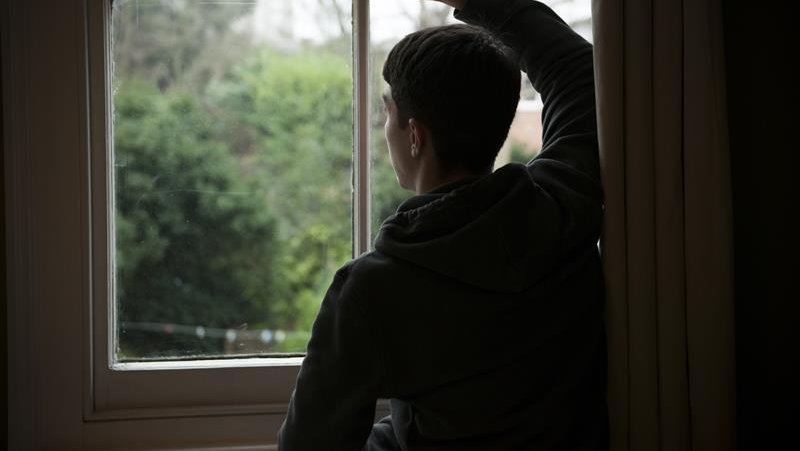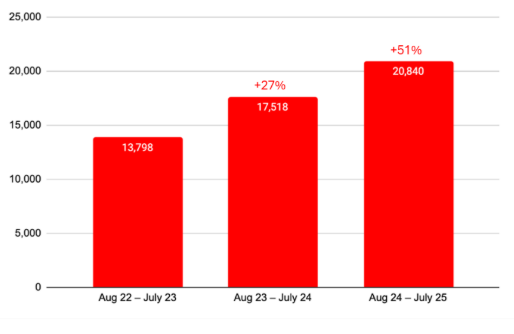UK parenting service sees 51% rise in demand for help with children's violent behaviour towards parents

“I felt like a punching bag... I would sit in my car and not want to go in the house.”
Leading UK children’s charity Action for Children says its digital parenting service has seen a big increase in parents facing violent behaviour from their children in the last three years, with unmet special educational needs or disabilities (SEND), mental health issues and school transition periods cited as key trigger points.
Action for Children’s Parent Talk supports parents and carers across the UK with children aged 0-19, and families with disabled and neurodivergent young people up to age 25. The free digital parenting service provides online advice and confidential one-to-one live chats with trained parenting coaches.(1)
Its article ‘Dealing with violent behaviour from your child or teenager’ saw 20,840 active users in the last year, a 51% rise since 2022.(2) The data also revealed a spike in parents seeking support after the summer holidays, with visits to the article jumping 46% between July and September last year.(3)
Analysis of Parent Talk’s one-to-one chats about violent behaviour over the last three years found a strong link with unmet needs in children, particularly SEND and mental health issues.
The report highlights the toll on parents and carers trying to manage a wide range of violent and abusive behaviour by their children. This included parents being put in headlocks, bitten, kicked, punched, slapped and threatened with knives, with some parents describing locking themselves in rooms for safety.
Many parents described being exhausted, fearful and at crisis point having tried everything - only to be faced with long waiting lists of up to three years, high thresholds for support and repeated rejected referrals.
Of those parents who received one-to-one support for violent behaviour(4):
- 64% also raised concerns around the child’s mental health or wellbeing
- 40% discussed concerns around special educational needs or disabilities (SEND)
- 27% raised issues with their child’s education, including the transition between primary and secondary school and emotionally based school avoidance
- Around a third of cases involved girls and two thirds involved boys
Case study: Natasha* is a single mum of one who was supported by Action for Children’s Parent Talk after struggling with her 10-year-old daughter’s challenging and aggressive behaviour. Her daughter has ADHD and is on a waiting list for an assessment for autism.
She said: “It started with verbal abuse, slamming doors and throwing things, but I could see it was leading to physical violence. Once when I was tying her shoes, she tried to kick me in the face, and she would constantly push into me and test physical boundaries. I noticed spikes in the aggression were often linked to changes in routine, such as going back to school after the holidays, or if she’d had a bad day at school.
“I couldn’t understand what was causing my child to be so angry at me every day. I felt like a punching bag. It was really affecting me mentally. I would sit outside in my car after work and not want to go into the house.”
A Parent Talk coach shared tools Natasha could use to help deescalate her daughter’s behaviour and improve their communication.
She said, “One of the things I’ve learnt from Parent Talk is general advice doesn’t always work for children who are neurodiverse. I had to find new ways of parenting to meet her needs, such as using non-verbal cues.
“Parent Talk has been a godsend - we’re in a totally different place than we were a year ago. I wouldn’t have been able to get this level of support and tailored advice just from speaking to other parents or friends and family. It doesn’t take a lot to completely change someone’s life – you just need the right advice for you and your child.”
Action for Children Parent Talk coach Leanne Balloch said: “The parents who reach out to us for help when their children are being violent towards them are often at crisis point.
“They frequently describe long waiting lists and being ‘bounced’ between different services - including their child’s school, GP and Child and Adolescent Mental Health teams (CAMHS) - and say they don’t know where else to turn.
“We also hear from parents about intense feelings of shame and isolation, with many worrying about being blamed and judged, or getting their child into trouble if they speak up.
“If you’re struggling, it’s important to reach out and talk to someone you trust. You can also speak to one of our Parent Talk coaches for free, confidential support.”
Martha Hampson, senior policy advisor at Action for Children, said: ‘‘Our report shows why it’s vital to recognise children’s violent behaviour to their caregivers as more than just a parenting issue. It’s clear from our analysis it is primarily driven by unmet needs, particularly in relation to educational or learning needs and mental health.
“It also highlights how this behaviour often escalates with age, increasing in severity as children enter adolescence.
“It’s vital we support families – whether online like Parent Talk, or through community family support services like Family Hubs – throughout the whole of childhood, not just the early years. Support needs to be visible, accessible and joined up.
“This will ensure specialist support for all children and young people at the earliest opportunity to prevent issues from escalating and ultimately limit the impact on the families involved.”
Action for Children is calling on the UK government to:
- Adopt a joined-up approach across government to supporting children and families through early adolescence.
- Recognise children’s violent and abusive behaviour to caregivers as a safeguarding issue primarily driven by unmet needs.
- Improve pathways into specialist support and evidence-based interventions for children with violent and abusive behaviour.
- Ensure timely specialist support for children with additional needs.
- Ensure early help is accessible for children and families across the whole of childhood.
For advice and support visit parent-talk.org.uk
*Names have been changed to protect identities
ENDS
MEDIA CONTACT:
Ally McLaren, Media Officer: 07779 866303 / [email protected]
Out of hours: 020 3124 0661 / [email protected]
NOTES TO EDITORS:
(1) In 2024/25, 318,866 parents and carers accessed the service, with a further 3,883 receiving specialist one-to-one support from coaches. Around 88% of parents engaging with the service were from England, 5% from Scotland, 4% from Wales and 3% from Northern Ireland. This is broadly representative of the population across the four UK nations.
(2) Active users of Parent Talk’s article ‘Dealing with violent behaviour from your child or teenager’ August 2022-July 2025 and % increase since 2022/23.

(3) Behind the behaviour: Understanding children's violent behaviour towards their parents.
Insights from Action for Children’s Parent Talk Service, 2025. Page 8. Report available at: https://media.actionforchildren.org.uk/documents/Behind_the_behaviour_-_Parent_Talk_2025.pdf
(4) As above. Page 9.
About Parent Talk
Action for Children’s Parent Talk supports parents and carers across the UK with children aged 0-19. It supports families with disabled and neurodivergent young people up to age 25. The free digital parenting service provides online advice and confidential one-to-one live chats with trained parenting coaches. In 2024/25, 318,866 parents and carers accessed the service, with a further 3,883 receiving specialist one-to-one support through 7,891 conversations with practitioners. parent-talk.org.uk
About Action for Children Action for Children protects and supports vulnerable children and young people by providing practical and emotional care and support, ensuring their voices are heard and campaigning to bring lasting improvements to their lives. With 342 services in local communities across the UK, in schools and online, in 2024/2025 we helped 551,400 children, young people and families. actionforchildren.org.uk
